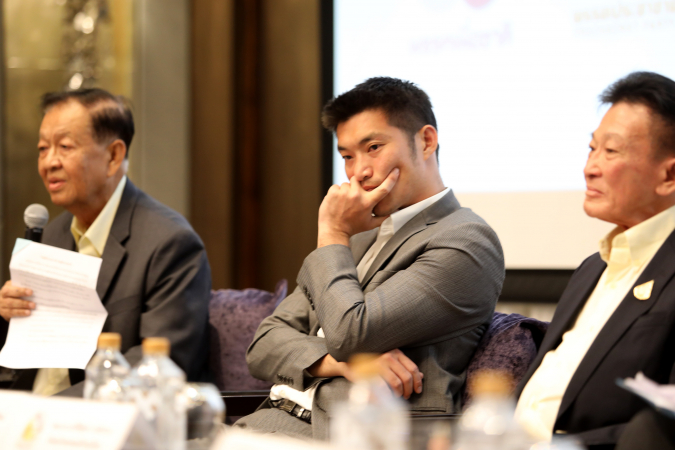Seven opposition parties to push for amendment of 2017 charter

Leaders and representatives of seven opposition parties organised a seminar on Sunday (July 21) on “Solutions to Thailand’s National Crisis” to discuss the problems within the government and the inadequacies of the newly formed Cabinet.
Prime Minister Prayut Chan-o-cha will be announcing his government’s policy direction to Parliament on Thursday (July 25.)
The seminar at Lancaster Hotel Bangkok was led by Sompong Amornvivat of Pheu Thai Party, who explained how the government led by Prayut had failed to fix economic problems in the last five years. He also blamed Prayut’s dictatorial style and the continuation of special powers under Article 44 announced by the junta, which had stifled criticism of the government, for eroding foreign investor confidence in Thailand’s political system.
Wan Muhamad Noor Matha of the Prachachart Party dismissed the new Cabinet as “hopeless”. He said Thai people had been waiting for five years to see some changes in the government only to be disappointed by this “not-so-new” Cabinet. He warned that the government will suffer from a trust deficit with the people as many of the Cabinet members had achieved no concrete results in the five years they were in power. “To make things worse, some of the ministers are even tangled in scandals and lawsuits, making their qualifications and integrity highly questionable,” he said.

Pheu Chart Party leader Songkram Kitlertphairoj said one of the monumental failures of the previous government was its inability to tackle economic disparity in the country. He said Thailand was now the country with maximum inequality, with 1 per cent of the richest people owning up to 70 per cent of the country’s wealth. He said the new government will only aggravate the situation, as they had already failed to improve the economy despite having had five years of near-absolute power. Their only solution now is to raise taxes and seek more loans, even though the country is already Bt7 trillion in debt, more than 10 times higher than the debt situation during the 1997 Tom Yum Kung crisis, he said.
Pol General Seripisut Temiyavet of the Seri Ruam Thai Party insisted that the root of all political problems was the 2017 Constitution, which allows the government to appoint 250 senators without going through the election process and also gives them the same rights to vote for prime minister as the members of the House of Representative who are rightfully elected by the people. He said this scheme reeks of corruption so much so that even the Washington Post had dubbed the election result “Thailand’s Faux Democracy”.
Future Forward Party leader Thanathorn Juangroongruangkit said all Thai citizens today had the obligation to put an end to this crooked regime in order to create a “good political system” and pass it on to the next generation as our proud legacy. He advocated a government that listens to people having opposing ideas and finds ways to solve problems together in peace, not by shutting them out completely. He also said that government investment should be diverted to creating a better transportation system in rural areas rather than building a high-speed railway connecting the three airports.

Dr Niyom Wiwatthanaditkul of the New Economics Party expressed concern that the government’s economic policies to facilitate distribution of wealth to the grassroots may not work and would benefit only a handful of capitalists. He also called for a more thorough study of the psychological impact on patients before legalising medical cannabis.
Lastly, Nikom Boonviset of Thai People Power Party also advocated amendment of the 2017 Constitution, calling it unlawful and undemocratic for senators to be selected by a committee appointed by the National Council for Peace and Order. This resulted in 249 of 250 senators voting for NCPO leader Prayut to be installed as the PM. Furthermore, the law requires 84 senator votes (more than one-third) to amend the constitution, which makes amendment of the 2017 Constitution even more difficult for everyone except the government itself.
Towards the end the seminar, Sompong and Thanathorn, who were the centre of attention, promised that the seven opposition parties would work together to fix the country’s problems by pushing for amendment of the 2017 Constitution and ensure a more transparent and lawful method of selecting the prime minister to create “real democracy” for Thailand.
Meanwhile, Seripisut said that from now on the opposition parties would be monitoring the government and Cabinet members closely, and he would continue to file cases in the Constitutional Court to investigate the qualifications and legitimacy of General Prayut to be elected PM. He would also seek investigation of the impartiality of the Election Commission and will discuss the results on July 25 in Parliament.
